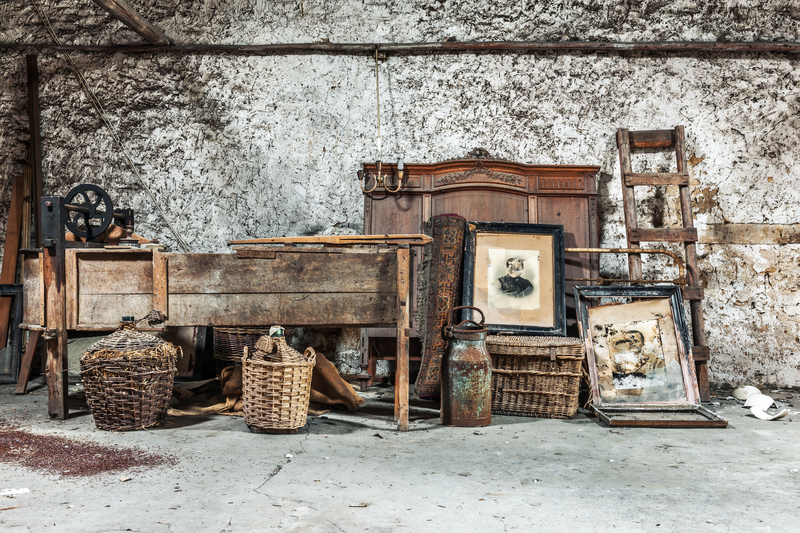Smart Decluttering Tips for Your Upcoming Move
Posted on 25/06/2025
Why Is Decluttering Essential Before a Move?
Decluttering your home before a move offers several benefits that can transform your relocation experience. Here's why:
- Saves Money: Movers typically charge based on the volume or weight of your belongings--reducing what you pack lowers your costs.
- Reduces Stress: Fewer items to organize, pack, move, and unpack means a less overwhelming process overall.
- Faster Packing & Unpacking: Streamlined packing means less time spent both before and after the move.
- Fresh Start: Letting go of the old and unused gives you a chance to create a clutter-free, organized space in your new home.
- Charitable Impact: Donating gently used items can help your community and reduce waste.

When Should You Start Decluttering Before Moving?
The sooner you start, the better! Ideally, begin decluttering for a move at least 4-6 weeks in advance. This gives you enough time to sort through possessions, make thoughtful decisions, and avoid last-minute stress.
Step-by-Step Smart Decluttering Tips for Your Move
1. Create a Decluttering Plan
Begin with a plan of action. Organize your decluttering process room by room. Allocate specific dates or hours per week to focus on each area of your home. By breaking the project into manageable chunks, you're less likely to feel overwhelmed and more likely to succeed.
- Make a List: Outline each room and storage area you need to declutter.
- Set Deadlines: Assign a realistic deadline for each room.
- Gather Supplies: Stock up on boxes, bags, and markers for sorting and labeling.
2. Sort and Categorize Your Belongings
Use the tried and true Four Box Method--label boxes or piles as Keep, Donate, Sell, and Trash. As you sort through each item, ask yourself:
- Do I use this regularly?
- Have I used it within the last year?
- Will this fit or suit the new space?
- Does it have sentimental or practical value?
If the answer is "no" to most of these, let it go. Remember, less is more when it comes to moving!
3. Start with Non-Essential Areas
Begin your smart decluttering journey with spaces you use less frequently, such as:
- Attics, basements, or storage sheds
- Guest bedrooms and closets
- Holiday decorations and rarely used kitchen gadgets
Tackling these areas first helps build momentum and makes everyday spaces feel less daunting when it's their turn.
4. Tackle Sentimental Items Last
One of the most challenging decluttering tips for moving house is to save sentimental or emotional items for the end. By then, your decision-making skills will be sharp, and you'll be better prepared to handle keepsakes and memories.
Tip: If you're having trouble parting with sentimental items, take photos to preserve memories or consider giving keepsakes to family members who will appreciate them.
5. Be Ruthless with Duplicates and Expired Items
Moving is your chance to ditch the excess. Scan each room for duplicate, broken, or outdated possessions:
- Extra kitchen utensils or appliances
- Expired toiletries, makeup, or medications
- Old electronics or chargers
- Tattered linens or towels
For products past their prime or that you'll no longer need, dispose of them safely. Only bring what you truly use to your new home.
6. Organize and Label as You Go
As you clear out and sort, keep items organized and clearly labeled. This makes packing--and, more importantly, unpacking at your new place--faster and more manageable.
- Group by Usage: Keep like items together (seasonal decor, office supplies, sports gear).
- Label Future Destination: Mark boxes with their new room name to simplify moving day.
- Separate Essentials: Prepare a dedicated box or bag for daily necessities you'll need immediately.
Specialized Decluttering Tips for Each Household Area
Kitchen
- Check Expiry Dates: Toss expired food, spices, and condiments.
- Assess Appliances: Donate or sell gadgets you rarely use.
- Purge Duplicates: Keep only what you need of cookware and utensils.
- Organize Containers: Match lids with containers and discard extras or mismatched sets.
Bedrooms and Closets
- Downsize Clothing: If you haven't worn it in a year, donate it.
- Shoes and Accessories: Keep only those in good condition or that you genuinely use.
- Children's Items: Donate outgrown toys and clothes, and recycle broken ones.
Bathroom
- Discard Expired Products: Safely dispose of old medications, makeup, and skin care items.
- Minimize Extras: Only bring along towels and toiletries you use regularly.
Living Room and Storage Areas
- DVDs, Books, and Games: Remove items you no longer enjoy or need.
- Decor: Keep only meaningful or fitting decorative items for your new space.
- Furniture: Assess if your furniture fits and suits your new layout.
Responsible Ways to Dispose of Your Items
An important aspect of smart decluttering for a move is disposing of unwanted items mindfully. Here are some sustainable ways to lighten your load:
- Donate: Give usable items to local shelters, thrift stores, or charitable organizations.
- Sell: List valuable or gently-used items on online marketplaces or host a garage sale.
- Recycle: Recycle electronics, paper, glass, and plastics according to local guidelines.
- Dispose Responsibly: Use designated collection points for hazardous waste, medications, or chemicals.
Apps and Tools to Simplify Decluttering
In today's digital age, there are many helpful tools to assist your decluttering for moving project:
- Sell: Facebook Marketplace, eBay, OfferUp
- Donate: Goodwill, Salvation Army pickup schedulers
- Inventory: Sortly, Encircle, or Google Sheets to catalog items
- Recycle: Earth911 or local waste management apps
Stay Motivated: Overcoming Common Decluttering Challenges
1. Emotional Attachment
It's natural to form attachments to belongings. If it's tough to let go, ask yourself: Would I buy this again today? Keep only items that add real value to your life.
2. Lack of Time
Life is busy, but even 15-20 minutes a day can yield impressive results. Prioritize the most cluttered or impactful areas first.
3. Too Much Clutter
If you're overwhelmed, recruit help from family or friends. You can also hire professional organizers or decluttering services to guide you through the process.

Final Packing Tips After Decluttering
- Use Quality Materials: Invest in sturdy moving boxes and packing supplies to protect your belongings.
- Label Everything: Detailed labels save time and confusion when unpacking.
- Pack by Room: This makes for a more systematic and efficient unpacking process.
- Keep Essentials Accessible: Pack a "first night" bag with toiletries, clothes, and essential tools.
Conclusion: Enjoy a Fresh Start with Smart Decluttering
Moving doesn't have to be chaotic! By applying these smart decluttering tips for your upcoming move, you'll create a more organized environment--and enjoy a smoother, more enjoyable transition. Start early, stay focused, and keep your new home in mind. Remember, every item you choose to keep is a deliberate part of your future life. Here's to a clutter-free move and an exciting new chapter!
Your Smart Moving Checklist
- Begin decluttering early
- Sort and categorize by room
- Donate, sell, or recycle responsibly
- Stay motivated and seek help if needed
- Celebrate your hard work and enjoy your new home!
Ready to make your move simpler and more organized? Implement these smart decluttering strategies today for a stress-free, successful move!
Latest Posts
Smart Decluttering Tips for Your Upcoming Move
Piano Relocation 101: Expert Tips on Avoiding DIY Mishaps
Freezer Storage 101: Ensuring Safety When Not in Use



